BusinessEurope Headlines No. 2022-11
Russia-Ukraine war: guidance for companies on sanctions is key
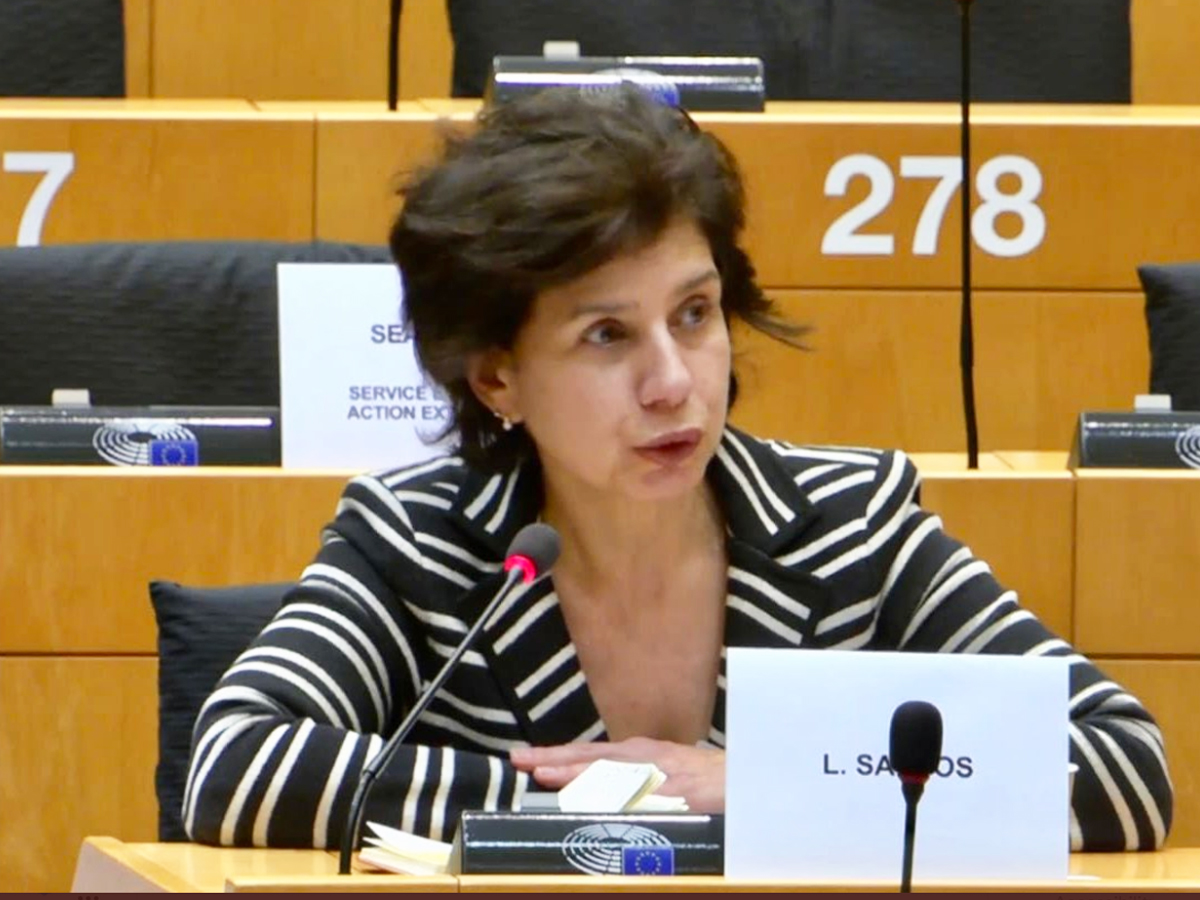
“To ensure consistency in implementation of sanctions related to the war in Ukraine, companies need clear guidance from the European Commission. This is critical to avoid unwanted impacts in the European economy and preserve the integrity of the Single Market. We are witnessing delays in customs procedures and different interpretations and application of sanctions across the EU and this needs to be addressed”, said Luisa Santos, Deputy Director General of BusinessEurope at a hearing at the Internal Market and Consumer Protection Committee in the European Parliament on 28 March. Santos reiterated BusinessEurope’s strong condemnation of Russia’s aggression against Ukraine and support for the measures, including sanctions, that were adopted by the EU as a response. She informed the members of the Committee about the main challenges that EU companies face, such as the increasing energy prices, shortages in access to raw materials and disruptions in supply chains, including problems in customs, transport, and logistics. “SMEs are particularly affected by the current situation, facing strong increases in energy, raw materials and transport prices in a moment they were struggling to recover from the impact of COVID-19,” Santos highlighted. She recognised that steps are already being taken to relieve the economy – for instance in the context of the Temporary Crisis Framework adopted in the area of state aid, and called for more measures to be discussed to strengthen the Single Market, in close cooperation with business.
Contact: Sofia Bournou
Morning Talks with Bernd Lange (MEP), Chair of the Committee on International Trade
Join Luisa Santos, BusinessEurope Deputy Director General and Bernd Lange, Chair of the Committee on International Trade at the European Parliament for a discussion about the world trade in the context of Russia’s invasion of Ukraine, sanctions, and impact on the supply chains. Register here.
Who do I call if I want to speak to the EU SME Envoy?
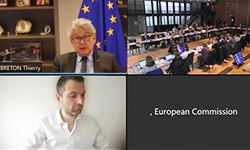 Following the outbreak of COVID-19, the recent developments related to the invasion of Ukraine by Russia – including sanctions regulations, and strong increase in energy prices, raw materials and transport – European SMEs are going through multiple and enormous challenges. The support from the European Commission is crucial, but many SMEs are struggling to survive in such a fragile situation and remain very much exposed. These were some of the key issues discussed during the SME Envoy Network meeting in Luxembourg, on 31 March, featuring the participation of European Commissioner for Internal Market Thierry Breton. The Chair of BusinessEurope Entrepreneurship and SME Committee, Fabrice Le Saché, stressed that “on the top of this, we have witnessed a growing concern about the cumulative effect of existing and incoming legislations, notably in the field of sustainability reporting. At EU level, the regulatory framework must be carefully designed to avoid excessive burden on SMEs”. To conclude, BusinessEurope recalled its request to appoint an EU SME Envoy urgently, without further delay. Le Saché pointed out that a strong, committed EU SME Envoy with an entrepreneurial mindset, representing a crucial interlocutor at the helm of the EU SME policy, is needed now more than ever to play a key role in supporting and guiding European SMEs through these difficult times.
Following the outbreak of COVID-19, the recent developments related to the invasion of Ukraine by Russia – including sanctions regulations, and strong increase in energy prices, raw materials and transport – European SMEs are going through multiple and enormous challenges. The support from the European Commission is crucial, but many SMEs are struggling to survive in such a fragile situation and remain very much exposed. These were some of the key issues discussed during the SME Envoy Network meeting in Luxembourg, on 31 March, featuring the participation of European Commissioner for Internal Market Thierry Breton. The Chair of BusinessEurope Entrepreneurship and SME Committee, Fabrice Le Saché, stressed that “on the top of this, we have witnessed a growing concern about the cumulative effect of existing and incoming legislations, notably in the field of sustainability reporting. At EU level, the regulatory framework must be carefully designed to avoid excessive burden on SMEs”. To conclude, BusinessEurope recalled its request to appoint an EU SME Envoy urgently, without further delay. Le Saché pointed out that a strong, committed EU SME Envoy with an entrepreneurial mindset, representing a crucial interlocutor at the helm of the EU SME policy, is needed now more than ever to play a key role in supporting and guiding European SMEs through these difficult times.
Contact: Daniele Olivieri
Trade agreements: engaging trading partners in sustainability
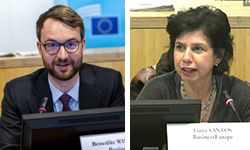 “Trade and investment agreements can be a powerful driver of sustainability. Through these agreements the EU engages trading partners to achieve more ambitious social and environmental commitments, while promoting better access to technologies, goods and services that are sustainable”, said Luisa Santos, Deputy Director General of BusinessEurope, at the 1st European Civil Society Forum on Trade and Sustainable Development (TSD). The event was hosted by the European Economic and Social Committee and took place on 29 March. “However, we need to keep in mind that trade agreements are the result of negotiations and they need to adjust as well to the reality and interests of our trading partners”, Santos added. The EU, she highlighted, must take a cooperative approach towards partner countries, to convince them of the benefits of adopting high-level international standards and work with the relevant international organisations to monitor their enforcement. Over the day, BusinessEurope intervened on two different panels: Santos spoke in the opening session on “TSD – where are we and where do we want to go”. In the afternoon, Benedikt Wiedenhofer, Adviser for International Relations spoke in the session “What framework for an inclusive and efficient monitoring of TSD?”.
“Trade and investment agreements can be a powerful driver of sustainability. Through these agreements the EU engages trading partners to achieve more ambitious social and environmental commitments, while promoting better access to technologies, goods and services that are sustainable”, said Luisa Santos, Deputy Director General of BusinessEurope, at the 1st European Civil Society Forum on Trade and Sustainable Development (TSD). The event was hosted by the European Economic and Social Committee and took place on 29 March. “However, we need to keep in mind that trade agreements are the result of negotiations and they need to adjust as well to the reality and interests of our trading partners”, Santos added. The EU, she highlighted, must take a cooperative approach towards partner countries, to convince them of the benefits of adopting high-level international standards and work with the relevant international organisations to monitor their enforcement. Over the day, BusinessEurope intervened on two different panels: Santos spoke in the opening session on “TSD – where are we and where do we want to go”. In the afternoon, Benedikt Wiedenhofer, Adviser for International Relations spoke in the session “What framework for an inclusive and efficient monitoring of TSD?”.
Contact: Benedikt Wiedenhofer
Platform work: improving legal certainty for business, employees and the self-employed
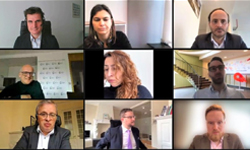 The European Commission’s proposal for a rebuttable presumption of employment is the wrong policy orientation at EU level as it is legally and practically unclear, creates negative economic and administrative impacts, and encroaches in diverse labour law solutions and industrial relations practices in the Member States. The key challenge ahead is to improve legal certainty at EU level in a neutral and balanced way for platforms, their employees and self-employed people providing services via online platforms. Against this background, there is a need to broaden the legal basis of the draft directive to relevant Single Market Treaty articles to ensure that it reflects well the different situations of both employees and self-employed platform workers. These were the key messages presented by Maxime Cerutti, BusinessEurope Director for Social Affairs, during the informal stakeholder roundtable on platform work, which was organised by MEP Elisabetta Gualmini on 29 March. He added that “the upcoming report from the European Parliament should take into account diverse industrial relations systems in the Member States, and the recent national labour laws put in place in a number of Member States to deal with platform work”.
The European Commission’s proposal for a rebuttable presumption of employment is the wrong policy orientation at EU level as it is legally and practically unclear, creates negative economic and administrative impacts, and encroaches in diverse labour law solutions and industrial relations practices in the Member States. The key challenge ahead is to improve legal certainty at EU level in a neutral and balanced way for platforms, their employees and self-employed people providing services via online platforms. Against this background, there is a need to broaden the legal basis of the draft directive to relevant Single Market Treaty articles to ensure that it reflects well the different situations of both employees and self-employed platform workers. These were the key messages presented by Maxime Cerutti, BusinessEurope Director for Social Affairs, during the informal stakeholder roundtable on platform work, which was organised by MEP Elisabetta Gualmini on 29 March. He added that “the upcoming report from the European Parliament should take into account diverse industrial relations systems in the Member States, and the recent national labour laws put in place in a number of Member States to deal with platform work”.
Contact: Rebekah Smith
How to improve the uptake and functioning of European Works Councils
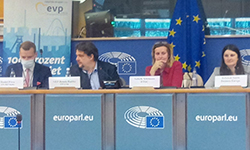 European Works Councils can be a useful tool for informing and consulting workers on relevant matters, but it’s up to the workers and the company to decide whether to go down this route. We’re committed to improving the uptake, by highlighting the benefits as well as being honest about the challenges of running a European Works Council (EWC). This was the key message of Rebekah Smith, BusinessEurope Deputy Director for Social Affairs at the European Parliament’s hearing on 31 March on the future of the EWCs directive. Reacting to calls for the directive to be revised, BusinessEurope highlighted that this is not what is needed to improve the functioning of existing EWCs or to promote more uptake by companies and workers. “We need to address practical issues to make improvements, and this comes with guidance, exchange and learning, not legislative changes”, Smith stated. She also reminded that EWCs sit in a broader framework of EU legislation, which include obligations on information and consultation of workers, as well as different national legislation and practices.
European Works Councils can be a useful tool for informing and consulting workers on relevant matters, but it’s up to the workers and the company to decide whether to go down this route. We’re committed to improving the uptake, by highlighting the benefits as well as being honest about the challenges of running a European Works Council (EWC). This was the key message of Rebekah Smith, BusinessEurope Deputy Director for Social Affairs at the European Parliament’s hearing on 31 March on the future of the EWCs directive. Reacting to calls for the directive to be revised, BusinessEurope highlighted that this is not what is needed to improve the functioning of existing EWCs or to promote more uptake by companies and workers. “We need to address practical issues to make improvements, and this comes with guidance, exchange and learning, not legislative changes”, Smith stated. She also reminded that EWCs sit in a broader framework of EU legislation, which include obligations on information and consultation of workers, as well as different national legislation and practices.
Contact: Rebekah Smith
Upgrade EU digital company law using existing infrastructure
 As a strong supporter of the digital transition, BusinessEurope is in favour of continuing the process of digitalising EU company law. Access to digital tools to perform key company operations is essential for companies to act faster in a highly competitive and increasingly connected business environment. Better cross-border access to publicly available company information should and can be achieved by making a more efficient use of the existing infrastructure of national company registers and by ensuring better connectivity between those. It should not consist of creating new administrative burden for companies regarding data provided. Careful consideration must be also taken to cybersecurity and to balancing transparency and protection of other values such as physical integrity and privacy rights of entrepreneurs (whose personal data can often be found in business registers). These messages were part of BusinessEurope's reply to the ongoing European Commission consultation on this topic.
As a strong supporter of the digital transition, BusinessEurope is in favour of continuing the process of digitalising EU company law. Access to digital tools to perform key company operations is essential for companies to act faster in a highly competitive and increasingly connected business environment. Better cross-border access to publicly available company information should and can be achieved by making a more efficient use of the existing infrastructure of national company registers and by ensuring better connectivity between those. It should not consist of creating new administrative burden for companies regarding data provided. Careful consideration must be also taken to cybersecurity and to balancing transparency and protection of other values such as physical integrity and privacy rights of entrepreneurs (whose personal data can often be found in business registers). These messages were part of BusinessEurope's reply to the ongoing European Commission consultation on this topic.
![]() Contact: Pedro Oliveira
Contact: Pedro Oliveira
Continued cooperation with the European Intellectual Property Office
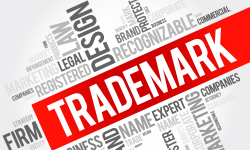 On the week of 21 March, BusinessEurope actively participated in a number of virtual meetings organised by the European Union Intellectual Property Office (EUIPO). Senior Adviser Elena Bertolotto and the Chairman of the Trade Marks and Designs Working Group, Martina Eberle, took part in the User Association Meeting, to discuss the EUIPO projects carried out in the last months. A particular focus was given on the recent trends on trademarks and designs filings, the measures adopted by the EUIPO in response to the Russia-Ukrainian crisis, and the SME Fund and related initiatives intended to support small and medium-sized enterprises to improve their competitiveness through the strategic use of intellectual property rights and to facilitate their registration. Finally, Carsten Johne, Member of the Trademarks and Designs Working Group, attended the EUIPO Liaison Meetings. These activities highlight BusinessEurope’s commitment in maintaining strong links with EU IP experts and cooperating with the EUIPO to continue improving the EU IP system and ensure that it remains user-focused.
On the week of 21 March, BusinessEurope actively participated in a number of virtual meetings organised by the European Union Intellectual Property Office (EUIPO). Senior Adviser Elena Bertolotto and the Chairman of the Trade Marks and Designs Working Group, Martina Eberle, took part in the User Association Meeting, to discuss the EUIPO projects carried out in the last months. A particular focus was given on the recent trends on trademarks and designs filings, the measures adopted by the EUIPO in response to the Russia-Ukrainian crisis, and the SME Fund and related initiatives intended to support small and medium-sized enterprises to improve their competitiveness through the strategic use of intellectual property rights and to facilitate their registration. Finally, Carsten Johne, Member of the Trademarks and Designs Working Group, attended the EUIPO Liaison Meetings. These activities highlight BusinessEurope’s commitment in maintaining strong links with EU IP experts and cooperating with the EUIPO to continue improving the EU IP system and ensure that it remains user-focused.
Contact: Elena Bertolotto
Calendar 
- 4 April: Market Access Day
- 7 April: Energy Conference
- 7 April: Morning Talks on International Issues No.4
Not yet a subscriber? Register here.
Reminder: please have a look at our privacy policy